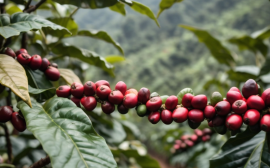Brewing a Sustainable Future: Leading Coffee Companies in 2025
The daily ritual of brewing and enjoying coffee connects millions across the globe, yet this seemingly simple act has a complex journey from bean to cup, often leaving a substantial environmental footprint. In 2025, a growing number of coffee companies are not only acknowledging this impact but are actively stepping up to champion sustainability, fundamentally transforming the coffee industry from the ground up. This article profiles some of the leading businesses at the forefront of this movement, highlighting their innovative approaches to carbon neutral roasting, ethical sourcing practices, and environmentally conscious packaging solutions. These pioneers are not merely producing coffee; they are cultivating a more responsible and sustainable future for the planet and the people who cultivate this beloved beverage, demonstrating that economic success and environmental stewardship can go hand-in-hand. These leaders are setting new industry benchmarks, proving that sustainability is not just a trend but a fundamental shift in how coffee is produced and consumed. Their efforts serve as an inspiration and a call to action for the entire coffee industry to adopt more environmentally sound and socially responsible practices.
These sustainable coffee leaders are tackling the environmental impact of coffee production through a variety of innovative methods. For instance, many are focusing on reducing their carbon footprint through carbon neutral roasting technologies, moving away from traditional fossil fuel-dependent methods. This includes the adoption of solar-powered roasters, as well as more energy-efficient equipment and processes, which significantly lowers their greenhouse gas emissions. Furthermore, these companies are actively engaged in sustainable agriculture practices, working with farmers to implement methods that minimize deforestation and soil degradation, while promoting biodiversity. By focusing on the entire supply chain, these companies are addressing the environmental challenges inherent in coffee production, seeking to minimize their impact at every stage, from farm to cup.
Beyond environmental considerations, ethical sourcing remains a core pillar of the sustainable coffee movement. Leading companies are implementing fair trade and direct trade models, ensuring that coffee farmers receive a fair price for their beans, often exceeding market rates. This not only provides economic stability for farming communities but also empowers them to invest in their own development and improve their livelihoods. Furthermore, these companies are committed to transparency and traceability, often utilizing third-party certifications to verify their ethical practices. This commitment to social responsibility is not just about fair wages; it also includes investments in community development projects, such as education, healthcare, and infrastructure, creating a positive ripple effect throughout the coffee-growing regions. The focus on ethical sourcing demonstrates that sustainability encompasses both environmental and social dimensions, creating a more equitable and just coffee industry.
In addition to roasting and sourcing practices, these companies are also revolutionizing packaging, recognizing that it can contribute significantly to environmental waste. Many are embracing biodegradable and compostable packaging solutions made from plant-based materials, which break down naturally, reducing the burden on landfills. Furthermore, they are actively promoting home composting through educational campaigns, encouraging consumers to participate in the circular economy. Reusable packaging options are also gaining popularity, with some companies offering refill programs and encouraging customers to bring their own containers. These innovative packaging solutions are not only reducing waste but also educating consumers about the importance of sustainable consumption, fostering a sense of collective responsibility. By rethinking their packaging, these companies are demonstrating that every aspect of the coffee journey can be transformed to be more sustainable.
The sustainable coffee industry is constantly evolving, with new technologies and practices emerging to further minimize environmental impact and enhance social responsibility. Future trends include advancements in precision agriculture, which uses data and technology to optimize water and fertilizer usage, reducing resource consumption and minimizing environmental pollution. Furthermore, blockchain traceability is being explored to improve transparency and accountability throughout the supply chain, ensuring that coffee beans can be traced back to their origin, which helps to combat fraud and promote ethical practices. These continuous innovations highlight the coffee industry’s commitment to sustainability and its willingness to embrace new solutions for a more responsible future. The ongoing pursuit of sustainability demonstrates that the coffee industry can be a force for positive change, both environmentally and socially.
Carbon-Neutral Roasting: Technologies and Practices
Roasting, a critical stage in the coffee production journey, traditionally carries a substantial environmental footprint due to its energy-intensive nature and reliance on fossil fuels. This impact poses a challenge to the sustainability goals of the coffee industry. However, innovative companies are pioneering carbon-neutral roasting practices, transforming this energy-intensive process into an environmentally responsible one. These pioneering companies are demonstrating that achieving carbon neutrality in coffee roasting is not just a possibility, but a tangible reality with significant positive impacts on the environment. Solar Roast Coffee, for instance, has effectively harnessed renewable energy by implementing solar-powered roasters, resulting in a remarkable 90% reduction in energy consumption compared to conventional methods. Furthermore, they are actively investing in reforestation projects within coffee-growing regions to offset their remaining emissions, effectively neutralizing their carbon footprint and contributing to ecosystem restoration. In 2024 alone, they reported offsetting 500 tons of CO2, demonstrating a quantifiable commitment to environmental responsibility. EcoBean Roasters showcases another innovative approach to carbon-neutral roasting by employing advanced heat recovery systems. This technology captures and reuses waste heat, effectively preheating subsequent batches and significantly reducing natural gas consumption by 60%. Their commitment extends further with a transition to biogas derived from coffee waste, effectively closing the loop on their carbon footprint and minimizing reliance on external energy sources. This not only reduces their environmental impact but also creates a more sustainable and circular production model. Beyond these individual examples, a broader movement towards sustainable coffee roasting is gaining momentum. The adoption of electric roasters powered by renewable energy sources is becoming increasingly prevalent, further reducing reliance on fossil fuels. Companies are also exploring innovative methods for minimizing energy consumption during roasting, such as optimizing airflow and roast profiles to improve efficiency. Moreover, the coffee industry is increasingly embracing third-party certifications, such as CarbonNeutral certification, to validate and communicate their carbon neutrality achievements to consumers. These certifications provide transparency and build trust, empowering consumers to make informed choices that support sustainable practices. The pursuit of ethical sourcing within the coffee industry intersects with carbon-neutral roasting, as sustainable agricultural practices on coffee farms can contribute to overall carbon footprint reduction. By supporting farmers in adopting climate-smart agriculture techniques, such as agroforestry and the use of organic fertilizers, companies can further enhance the sustainability of their coffee production from bean to cup. This holistic approach addresses both environmental and social responsibility, ensuring fair trade practices and supporting the livelihoods of coffee farmers. The transition to carbon-neutral roasting is not merely a trend but a necessary step towards a more sustainable coffee industry. As consumer demand for ethically and environmentally responsible products grows, companies that prioritize carbon neutrality in their roasting processes are positioning themselves as leaders in the industry. This commitment not only benefits the environment but also enhances brand reputation and fosters consumer loyalty, driving positive change throughout the coffee supply chain.
Ethical Sourcing: Fair Trade and Direct Trade Models
Ethical sourcing is not merely a trend but a fundamental pillar of the sustainable coffee movement, addressing the social and economic well-being of coffee farmers worldwide. It goes beyond environmental concerns, delving into the intricate relationships between producers, consumers, and the environment. Fair trade and direct trade models are leading the charge, ensuring farmers receive fair prices for their beans, exceeding market rates and providing a safety net against volatile price fluctuations. Organizations like FairTrade International and the World Fair Trade Organization establish standards and certifications, assuring consumers that their coffee purchases contribute to farmer empowerment and community development. This commitment to ethical sourcing translates into tangible improvements in the lives of coffee-growing communities. FairTrade Origins, for instance, invests a portion of its profits back into these communities, supporting projects such as building schools, healthcare facilities, and clean water initiatives. These investments address fundamental needs, fostering long-term stability and improving the quality of life for farmers and their families. Direct trade models, like those implemented by Direct Connect Coffee, prioritize long-term partnerships with farmers, moving beyond transactional relationships to build collaborative alliances. These direct connections facilitate knowledge sharing and technical assistance, empowering farmers to improve crop quality, implement sustainable farming practices, and increase their yields. By providing training on topics such as soil health, water management, and pest control, direct trade fosters environmental stewardship alongside economic empowerment. Furthermore, these partnerships often involve establishing farmer cooperatives, enabling farmers to collectively manage processing and export, giving them greater control over their product and a stronger voice in the value chain. This collective power enhances their bargaining position and ensures a more equitable distribution of profits. The environmental impact of ethical sourcing is significant. Sustainable farming practices, promoted through direct trade and fair trade initiatives, minimize the use of harmful chemicals and fertilizers, protecting biodiversity and reducing water pollution. Shade-grown coffee, often a hallmark of ethically sourced beans, provides crucial habitats for migratory birds and other wildlife, contributing to ecosystem preservation. By supporting sustainable agriculture, these practices mitigate the environmental footprint of coffee production and contribute to the long-term health of the planet. Consumers, by choosing ethically sourced coffee, play a crucial role in driving this positive change, creating a market demand for sustainable practices and social responsibility. The demand for transparency and traceability is also growing, prompting companies to adopt blockchain technology to track the journey of coffee beans from farm to cup, ensuring authenticity and ethical sourcing throughout the supply chain. This empowers consumers to make informed choices and support companies genuinely committed to sustainability. Ultimately, ethical sourcing is not just about better coffee; it’s about building a more sustainable and equitable future for the entire coffee industry, from the farmer to the consumer.
Innovative Packaging: Biodegradable and Reusable Solutions
The journey of sustainable coffee extends beyond the roasting process; packaging is a critical area where significant environmental impact can be mitigated. BioPack Coffee exemplifies this by utilizing 100% compostable packaging derived from plant-based materials. This packaging is designed to break down naturally in a compost environment, drastically reducing landfill waste and promoting a circular economy. They enhance their impact through educational campaigns, encouraging consumers to actively participate in home composting, which is a crucial step in closing the loop of waste management in the coffee industry. Reusable Coffee Co. takes a different approach, implementing a closed-loop system that offers reusable containers for both wholesale and retail customers. This model significantly reduces the need for single-use packaging, which is a major contributor to environmental pollution. They have established partnerships with local cafes to facilitate the collection, sanitization, and reuse of these containers, creating a practical and efficient system that minimizes waste. These companies are leading the way in innovative packaging solutions, demonstrating that reducing waste is not only possible but also essential for a sustainable future within the coffee industry.
Furthermore, the selection of packaging materials is not just about waste reduction; it’s also about reducing the carbon footprint associated with production and transportation. Companies are now exploring lighter-weight materials and more efficient packaging designs to minimize the environmental impact of their supply chains. This includes using recycled content in packaging where possible and opting for materials that require less energy to produce. The move towards biodegradable and compostable packaging is a significant step, but the industry is also focusing on the entire life cycle of packaging, from sourcing to end-of-life management. This holistic approach ensures that environmental impact is minimized at every stage of the process. The increasing adoption of third-party certifications like Fair Trade and Rainforest Alliance further influences consumer perception, with many customers willing to pay a premium for sustainably sourced coffee, reflecting a growing awareness and demand for ethical and environmentally responsible products. This demand is not just for the coffee itself but also for the packaging it comes in.
Beyond the materials themselves, the design of packaging plays a crucial role in its sustainability. Companies are now focusing on creating packaging that is easily recyclable or compostable, with clear instructions for consumers. This includes using minimal inks and adhesives, opting for water-based or soy-based inks, and simplifying the overall design to make it easier to process at recycling facilities. The goal is to create packaging that is not only environmentally friendly but also practical and functional for both the company and the consumer. This attention to detail is crucial for ensuring that sustainability efforts are effective and contribute to a truly circular economy. The coffee industry’s shift towards sustainable packaging is not just a trend, it’s a fundamental change in how businesses operate, driven by both environmental responsibility and consumer demand.
Moreover, the development of innovative packaging solutions is often intertwined with advancements in sustainable agriculture and ethical sourcing practices. Companies committed to sustainability are increasingly looking at the entire supply chain, from the farm to the consumer’s cup. This includes working with farmers who use sustainable agricultural practices and ensuring fair wages and working conditions for all involved. The move towards biodegradable and reusable packaging is often part of a larger commitment to sustainability, reflecting a holistic approach to business that considers both environmental and social impacts. This integrated approach is becoming increasingly important as consumers become more aware of the complex issues surrounding coffee production. The focus on sustainable packaging is therefore not an isolated effort but a critical component of a broader sustainability strategy within the coffee industry. The use of blockchain traceability is also being explored as a way to provide consumers with more information about the journey of their coffee, including details about the packaging used and its environmental impact.
Future Trends and Emerging Technologies
The sustainable coffee industry is not static; it’s a dynamic field where continuous innovation is crucial for minimizing environmental impact and enhancing social responsibility. Looking ahead, we see advancements in precision agriculture playing a pivotal role. This involves utilizing data-driven insights to optimize resource use, particularly water and fertilizer application, which directly reduces the environmental footprint of coffee cultivation. For instance, some farms are now using soil sensors and satellite imagery to precisely target irrigation, reducing water waste by as much as 30%, a significant step towards more sustainable agriculture practices. Furthermore, the integration of technology is not just limited to farming; it’s also revolutionizing the supply chain. Blockchain technology, for example, is rapidly being adopted to enhance traceability, ensuring transparency from farm to cup. This allows consumers to verify the sustainability claims of their coffee, building trust and driving demand for ethically sourced beans. Consumers can now scan a QR code on their coffee packaging and see a complete audit trail of the beans, including where they were grown, by whom, and under what conditions, thereby increasing confidence in sustainable coffee practices. The development of alternative packaging materials is also a major area of innovation. Beyond the now-common compostable and biodegradable options, we’re seeing the emergence of mushroom-based composites and other bio-derived materials that promise even more eco-friendly solutions. These new materials are not only compostable but also often require less energy to produce, further reducing their environmental impact. For example, some companies are using mycelium, the root structure of mushrooms, to create packaging that is both durable and completely biodegradable, offering a truly circular solution. The industry is also seeing a rise in the adoption of third-party certifications, which provide an independent assessment of sustainability practices. Certifications like Fair Trade and Rainforest Alliance help ensure that coffee is produced in a way that is both environmentally sound and socially responsible. These certifications often come with strict standards that companies must adhere to, including requirements for fair wages, safe working conditions, and environmental protection. This creates a framework for accountability and helps to drive industry-wide improvements. The future of sustainable coffee also hinges on the continued growth of consumer awareness and demand for ethically and environmentally responsible products. As more consumers actively seek out sustainable options, the coffee industry will be further incentivized to innovate and adopt practices that minimize their environmental impact and enhance social equity. This includes everything from carbon neutral roasting techniques to the implementation of direct trade models that empower coffee farmers. The journey towards a truly sustainable coffee industry is ongoing, but the progress made so far is encouraging, and with continued innovation and commitment, we can ensure that the pleasure of a good cup of coffee does not come at the expense of the planet or the people who grow it.



